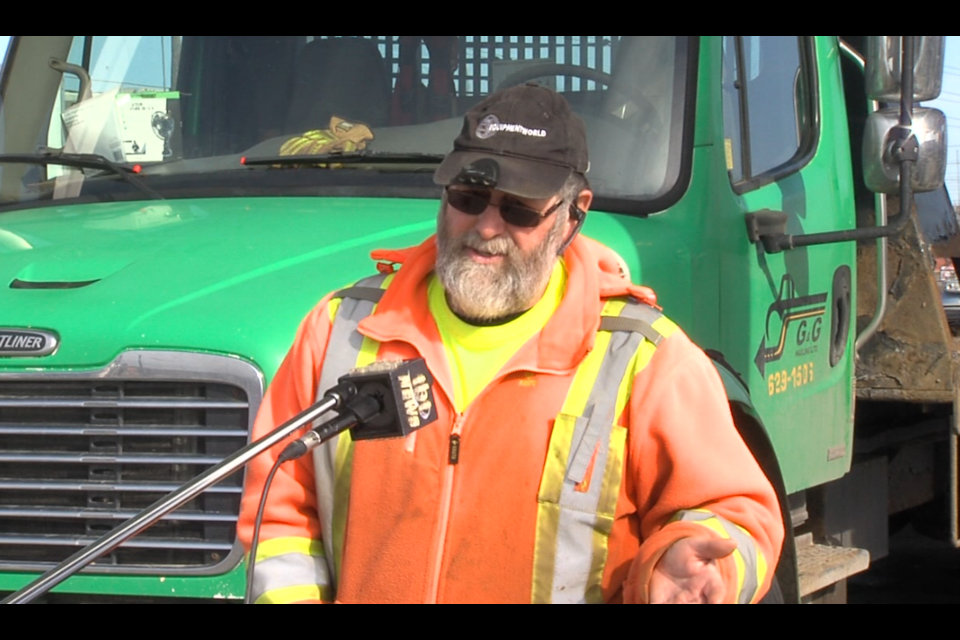THUNDER BAY — Long-haul truck drivers say the closure of restaurants and restrooms because of the COVID-19 pandemic has made a difficult job even more stressful.
But they say most truckers are "wired" to work, and will continue to do their best to keep vital goods moving along Canada's vital supply chain until conditions return to normal.
In an interview Monday at a Thunder Bay-area rest stop, Sault Ste. Marie-based driver David Houle lamented the lack of amenities.
"You can't get hot meals at the end of the day. I had to put a microwave in, and the company picked up coolers for us to put in the trucks. Stopping for a coffee, no, not so much anymore," he said.
The biggest challenge these days, Houle said, is is finding an open washroom.
"You can't park just anywhere. It has to be someplace safe, with facilities that you can actually use. It requires you to plan your day. We've always had to do that but this adds a new and different component," Houle said.
He cited situations where drivers have been left waiting at a loading dock for up to six hours with no restroom available.
"You have to eat. You have to go to the bathroom. With the amount of closures, it's a nightmare."
Houle said drivers are expected to go about their jobs as if things were normal, when in actuality a great deal has changed.
Ken Gallinger of Thunder Bay's G and G Hauling agrees that trucking is a lot harder these days.
"To go to the bathroom, everybody just takes that for granted, except for truck drivers. The places are closed, and you have to make a decision where you're going to stop to get a coffee or go to the bathroom. It's difficult now," Gallinger said.
He said truckers at all times are trying to keep mindful of the need to avoid being infected by COVID-19.
"It's pretty tough because we touch things, and we try to disinfect things...your customers have to sign the agreements, and if you let them use your pen, you've got to disinfect it. Of course there's no shaking hands."
Gallinger said processing procedures at destination points have also changed.
"Most of the places that you go, there's a big sign that says 'Drivers remain in vehicle.' You have to get ahold of security. They go through a series of questions about where you have been and your health situation before you're allowed on site. You try to stay away from people."
Houle noted that drivers who must already cope with prolonged absences from their families are now increasingly isolated on the road as well.
"Drivers used to sit down at the end of the day. You used to be able to walk across the parking lot and talk with a driver you've never seen before, and actually sit down and have dinner with a few people, then go on your own way. It's not happening anymore," he said.
Houle said he's seen social media posts from members of the public expressing thanks to truckers for staying on the job, and is glad people appreciate their critical role.
"If we don't go to work, the country actually falls apart. There is nothing to buy, no food in the stores, no gas. The country stops. Period."
Ontario Transportation Minister Caroline Mulroney has asked businesses to help truckers during the COVID-19 pandemic.
"We are calling on all business owners to support truck drivers when they are stopping to rest, get gas or use washrooms," Mulroney said in a recent joint statement with Health Minister Christine Elliott.
"In these extraordinary times, we have extraordinary heroes. Our truck drivers are these heroes," the ministers said. "They are working long hours, day and night, delivering food and equipment and other essential supplies for Ontario families."
Labour Minister Monte McNaughton tweeted photos of signs showing washrooms that were closed to truckers.
"This is a disgrace. Drivers get goods to market. Let's show them some respect," McNaughton said.
- TBNewsWatch



